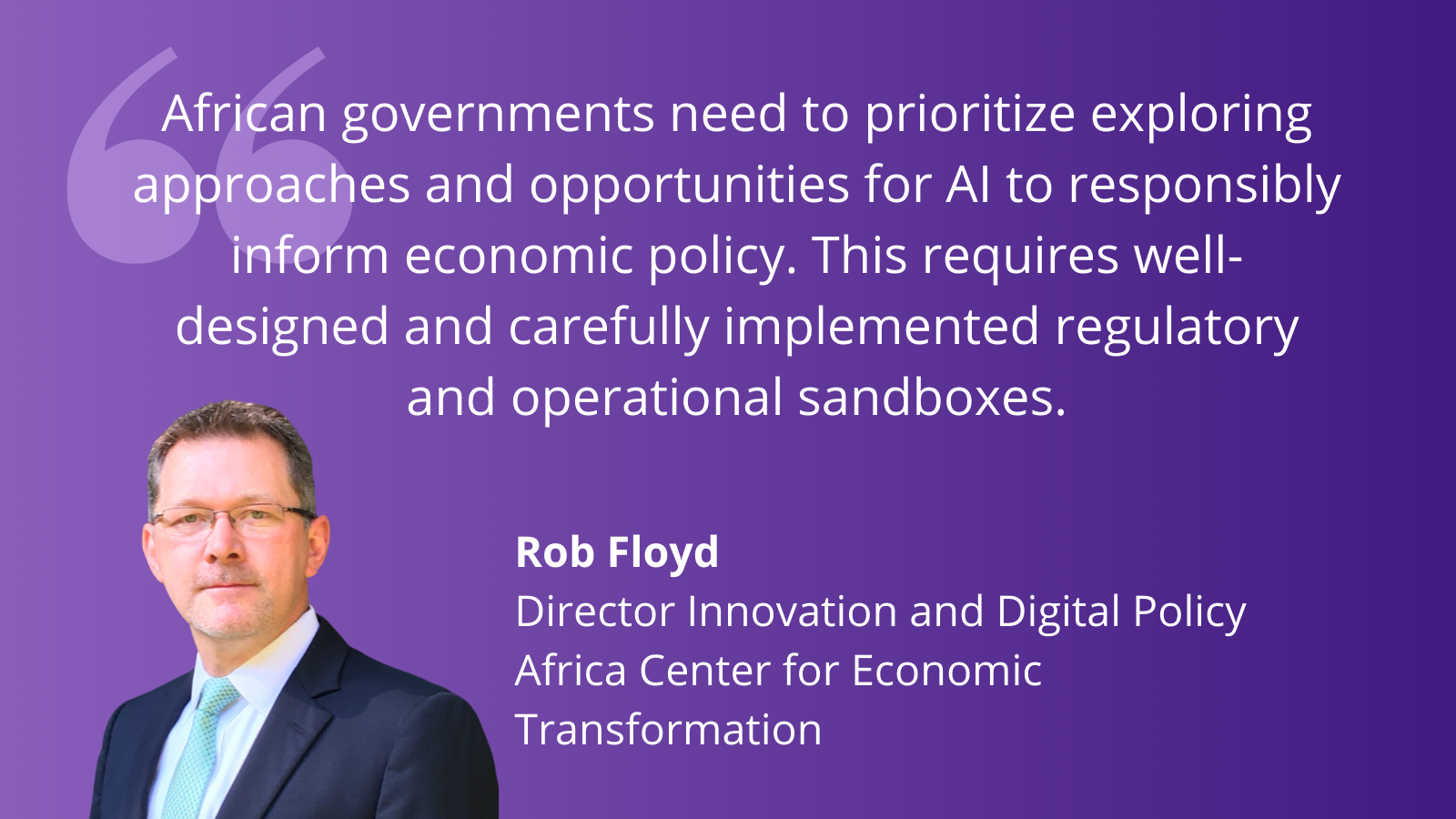Rob Floyd, Director, Innovation and Digital Policy, Africa Center for Economic Transformation.
Fourth Industrial Revolution (4IR) data-driven tools can help Africa transform its economy and achieve its development goals. The continent faces many challenges and opportunities, including a demographic bulge, climate change, and shifting geopolitical realities. In order to navigate them all successfully, Africa needs to responsibly apply artificial intelligence (AI) and over-the-horizon technologies not only in areas such as health, education, agriculture, and disaster risk management, where they are already widely deployed but also in the development and implementation of fiscal and monetary policy.
African governments need to prioritize exploring approaches and opportunities for AI to responsibly inform economic policy. This requires well-designed and carefully implemented regulatory and operational sandboxes.
As the African Union and member states continue to improve digital policy across the continent, they will address many governance challenges around data in general, and AI in particular. But this will take many years. The European Union, with only twenty-seven member states and significant capacity, continues to struggle with a coherent digital policy that reflects the needs of citizens, the private sector, and governments. Africa’s digital policy evolution will be slower.
But in the meantime, operational and regulatory sandboxes can serve as one tool to explore, experiment, test, and build models. They can build trust, reduce uncertainty, and test innovations. They can also identify data availability and quality, address biases, and enshrine ethical and responsible norms. However, utmost care must be taken to ensure ethical and responsible data use, especially in the context of economic policy. There is simply no room for error with regard to policy on interest rates, economic forecasting, inflation targets, or tax rates as the impact of bad actors or poor data management can be catastrophic to national economies. This is why the use of operational and regulatory sandboxes, which can be undertaken “offline” and as confidence-building measures is so important.
The African Center for Economic Transformation (ACET), a pan-African economic policy institute based in Accra, Ghana is designing a multi-country, multi-year exercise with sandbox exercises that will test AI approaches for economic policymaking. ACET has recently completed the first phase of an assessment of opportunities to leverage AI for economic policy. Artificial Intelligence for Economic Policymaking: The Frontier of Africa’s Economic Transformation – ACET (acetforafrica.org). The report outlines a wide range of applications, from nowcasting economic growth, to faster decision-making in monetary policy, to designing domestic resource mobilization policies with greater tax sensitivity. It also highlights key challenges such as data availability, data security, privacy and ownership, and the need for a more robust ecosystem with a greater emphasis on digital skills.
The next steps in this initiative will include a peer learning process among African governments and the establishment of a community of practice. Given the general lack of experience with sandbox exercises in many African countries, there is an immense learning opportunity for governments, regulators, and the private sector. There will also be an important role for the African Union, the AU Development Agency (AUDA-NEPAD), Smart Africa, the African Development Bank, and other actors at the nexus of economic policy and digital policy. These organizations can help facilitate data sharing across borders, interoperability of data-based platforms, and defining an Africa-centric approach to data policy.
- Read more from other contributors in this blog series here
- The Datasphere Initiative has launched a complete online learning experience: “A Guide to Cross-Border Sandboxes for Data.” Enroll for the online course here.
Rob is the Director for Innovation and Digital Policy at the African Center for Economic Transformation (ACET), a leading pan-African policy institute based in Accra, Ghana. He leads programs related to digital strategies, innovation ecosystems, digital infrastructure, and skills development for the Fourth Industrial Revolution.
Rob has led ground-breaking work on AI in economic policy, the first AI challenge for regional infrastructure in Africa, and the first multi-country analysis of industrial innovation policy on the continent.




